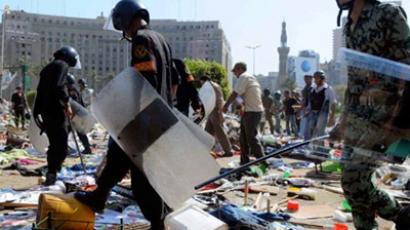Libya’s Egyptian déjà vu
Cheering crowds in Tripoli's Green Square left many around the world with a feeling of déjà vu. In February, Egyptians were hoping for a brighter future when they toppled Hosni Mubarak. Now it is a feeling of disappointment that unites them.
Six months on, many Egyptians say their hopes have been crushed by reality.“You know, I loved the revolution. When it happened, I welcomed it,” an Egyptian man tells RT. “That looked at that time like a light at the end of the tunnel. But you see it’s not getting any better. If we have nothing to eat, just don’t tell me about democracy! For hungry people it just doesn’t matter.”The Egyptians now are not governed by their chosen leaders. Instead, it is their army that is in control – the army that has strong ties with the US and is sponsored by Washington.“The military regime, the edifice, the institutions that were the fundamental essence of the Mubarak regime – those remain,” Brian Becker of the Answer Coalition explains. “And we can see that thousands of people have been brought to military trial since the end of the popular revolution that ousted Mubarak.”In Tripoli, the body taking over is the National Transitional Council, also not chosen by the Libyan people. Yet, the council has been recognized as the legitimate government of Libya by all the foreign allies who have been helping oust Gaddafi.Many Libyans are outraged by the fact that foreign powers are effectively making vital choices for them.“There’s too much wealth and geopolitical strategic value for Libya to let it only become reformed in democratic rights and universal participation by the citizenry,” says French journalist and blogger Moe Seager. “Western powers need to implement [the] Western economic and military agenda. And therefore, people who will eventually command the political situation in Libya and military situation in Libya will indeed be supported by Western powers.”Western powers have thrown all their support behind the Libyan National Transitional Council, giving them billions of dollars and weapons to gain control. But the rebels are far from being a united group.“What Libya is going to face after that is a prolonged chaos. Nobody knows the outcome,” says Frankfurt-based political analyst William Engdahl. “This is tribe against tribe; this is not democracy against totalitarianism.”Revolutions in Egypt and in Libya have developed under different scenarios. In Egypt, it was an unarmed uprising by millions. In Libya, it has been an insurgency flooded with weapons by the West, and those weapons are not going anywhere.Many analysts say Libyans might find themselves in a much worse situation than the Egyptians, because on top of a power crisis similar to the one Egyptians are having, Libyans could be facing a fresh outbreak of violence at the hands of the armed mob.














